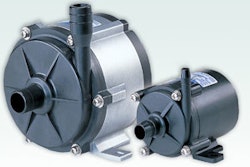PLAINFIELD, Vt. (AP) — Frank Kipe thought he had everything he needed to launch a business selling what he described as the world's most expensive ice cream: two Jersey cows, a 10-acre farm and an old barn.
Then he found out that he would have to pasteurize his milk before making his ice cream. Equipment for commercial farms was bulky and cost tens of thousands of dollars, so he built his own pasteurizer. Then he built more to sell. His pasteurizer business boomed, and the ice cream was forgotten.
With small dairies popping up nationwide to meet the growing demand for locally produced food, the market for equipment for five-cow, 10-sheep and 20-goat operations has grown, too. Major manufacturers long ago gave up producing equipment for small dairies, which seemed to be a thing of the past, leaving the field open for entrepreneurs like Kipe.
He sold two small pasteurizers the first year to his milk inspector's other clients. In the six years since, he has sold about 160 to dairies in about 30 states along with Bermuda, Kosovo and Australia. He expects to sell up to 80 this year, installing them himself with his wife. His biggest markets have been New York, Pennsylvania, Texas and Vermont.
"The key thing is to be flexible," Kipe said, "so that's why we designed our pasteurizer, for example, to work as a legal pasteurizer. But it will also work as a cheese vat, it'll also work as a kefir or yogurt incubation vat, and it will even work as a small bulk tank to store the milk until you are ready to process."
Pasteurization is a process in which milk is heated to kill disease-causing organisms. Federal law requires milk and most other dairy products to be pasteurized before sale to the public.
Kipe's system, sold by MicroDairy Designs in Smithsburg, Md., includes a large vat where milk is heated to 145 degrees for 30 minutes. Another system designed by a Vermont farmer pulls the milk through a heater at a gallon per minute, warming it to 161 degrees for 15 seconds before it is quickly cooled.
"For probably 30 years there wasn't a market for these very small operations and now there is a market and so now we're starting to see the equipment coming in," said Dan Scruton, the Vermont Agency of Agriculture's dairy section chief. "Some's being imported, some's being developed around the United States and in Vermont."
Sharon Peck and her daughter Kim Ingraham invested about $16,000 in one of Kipe's pasteurizers about two years ago to process milk from their herd of about 50 Nigerian dwarf goats at Willow Moon Farm in Plainfield, Vt. Their model has two different-sized inserts for the vat, allowing them to process 15 to 35 pounds of milk at a time for their fresh chevres and feta.
"It's really nice for us because this time of year we have much less milk, so she's able to use the smaller vat," Peck said. "And in another few weeks she'll swap that for the bigger one because she'll be in full swing for the season."
About half of Kipe's customers make cheese, and he said most make a variety of products, including yogurt, kefir and flavored milk drinks.
Steve Judge and five investors spent more than $1 million and six years to develop the Bob White Systems pasteurizer, which they hope to get approved for sale in Vermont this summer and then expand to other states.
Judge, who milks four cows that produce about 20 gallons of milk a day in South Royalton, said the system was designed to fit dairies like his, which produces enough milk to supply about 60 families on a regular basis. He plans to sell it for about $35,000.
His company also sells bulk tanks, small milking equipment and livestock supplies and is developing small butter churns and bottlers. Sales grew by nearly 40 percent last year.
"Because that end of the market is so underserviced, because everybody just gave up on it," Judge said.
He plans to set up a free demonstration pasteurizer at Jersey Girls Dairy in Chester, where Lisa Kaiman hopes to one day bottle her own milk and make sweet cream butter and ricotta and mozzarella cheeses. With pasteurization, she can diversity her products and sell to local chefs and the public, earning more than if she kept selling milk wholesale.
There's a "huge potential," Kaiman said. "I can move all my own product. I can move all my own milk. I don't have to rely on anybody else."
While even small pasteurizers are a big investment for small farms, Peck said she wasn't concerned about losing money because she figures she'll be able to sell the equipment if she gets out of cheese making.
"Used dairy equipment is snatched up pretty quickly," she said.






















